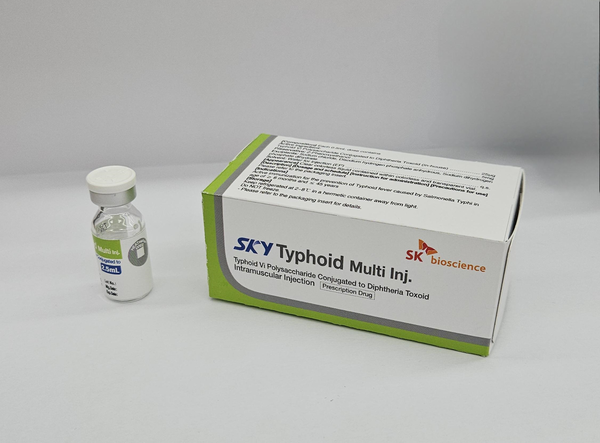A typhoid conjugate vaccine developed by SK bioscience has received the World Health Organization's (WHO) Pre-Qualification (PQ) certification, a green light to enter new overseas markets.

SK bioscience said Friday that its typhoid conjugate vaccine, SKYTyphoid Multi-Injection (NBP618 in the project name), jointly developed with the International Vaccine Institute (IVI), has received WHO PQ certification. The company added that it has demonstrated world-class technology by achieving WHO PQ certification for typhoid vaccine, following two influenza and chickenpox vaccines.
WHO PQ is a system that certifies the safety, efficacy, and GMP of vaccines by evaluating the manufacturing process, quality, and clinical trial results based on strict standards. If the examination passes, the vaccine can bid for international procurement.
It involves a rigorous process that includes reviewing technical documentation, including clinical trials and quality data, sample quality testing, and due diligence on factory GMP facilities and quality control levels. WHO’s PQ certification is essential for participating in international tenders organized by U.N. agencies, including UNICEF and the Pan American Health Organization (PAHO).
It is considered a factor in proving the competitiveness of technology in the global market.
SKYTyphoid, which received WHO PQ certification, is a typhoid conjugate vaccine jointly developed by SK bioscience and IVI with research support from the Bill & Melinda Gates Foundation. It utilizes the “purified Vi polysaccharide-diphtheria toxoid conjugate' method, which conjugates the diphtheria toxin protein (diphtheria toxoid), which acts as a carrier, to the polysaccharide of the typhoid bacteria, which acts as an antigen.
As a result, it can be administered to infants and children aged six months to two years. It is expected to provide sufficient immunogenicity and long-term protection with a single dose compared to existing oral live or polysaccharide vaccines.
Based on global clinical results, SKYTyphoid has won approval for export by the Ministry of Food and Drug Safety in 2022. SK bioscience and IVI confirmed the excellent immunogenicity and safety of SKYTyphoid in a phase 3 clinical trial conducted in Nepal on 2,160 healthy people aged six months to 45 years old.
The study, which was compared to a conventional polysaccharide-protein conjugate typhoid vaccine with WHO PQ authorization, confirmed the immunogenicity of SKYTyphoid and demonstrated that it can be safely administered across all age groups in the study. The study results were published in The Lancet Infectious Disease, a sister journal of the world-renowned medical journal The Lancet and one of the most authoritative journals in infectious diseases.
SK bioscience plans to expand the global market, including major typhoid-endemic countries through public procurement markets, as there is a high demand for typhoid vaccines, especially in underdeveloped countries. According to the WHO, 11 to 20 million typhoid fever cases are reported worldwide every year, of which about 120,000 to 160,000 are fatal.
"Typhoid is more prevalent at higher temperatures, and the risk is increasing with climate change and rising antibiotic resistance," IVI Director General Jerome Kim said. "Vaccination is essential to prevent and control typhoid effectively, and IVI will continue to work with partners, including SK bioscience, to ensure that those most in need of the vaccine receive it."
SK bioscience President and CEO Ahn Jae-yong said, "We are pleased that our global collaboration to address the global vaccine supply imbalance and improve public health has been recognized by the WHO PQ certification. In addition to the WHO PQ certification, we will obtain additional country-specific approvals to ensure the vaccine can be supplied quickly."
Related articles
- Vaccine manufacturers affected by the endemic struggle to boost declining sales
- SK bioscience moves up one notch in MSCI’s ESG rating
- SK bioscience, Sanofi seek FDA nod for phase 3 study of 21-valent pneumococcal conjugate vaccine
- SK bioscience reorganizes into 6 units, appoints ex-Pfizer exec as vice president
- SK bioscience celebrates a decade of collaboration with Sanofi through expansion of vaccine plant
- Oral cholera, Covid-19, RSV vaccine developers win 2024 IVI-SK bioscience Park MahnHoon Award
- SK bioscience paves way for exporting SKY Cellflu to southern hemisphere

